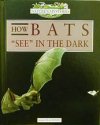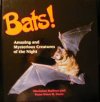Echoes of Hunting Additional Information
To see movies of bats capturing insects or zeroing in on targets, go to www.newsdesk.umd.edu/scitech/release.cfm?ArticleID=1214 and www.newsdesk.umd.edu/scitech/release.cfm?ArticleID=965 (University of Maryland).
To learn about big brown bats, see ohiodnr.com/wildlife/Resources/wildnotes/pub372.htm (Ohio Department of Natural Resources) or animaldiversity.ummz.umich.edu/site/accounts/information/
Eptesicus_fuscus.html
(University of Michigan).
You can find out more about vampire bats at www.nationalgeographic.com/kids/creature_feature/0110/vampirebats.html
(National Geographic), www.thewildones.org/Animals/vampire.html (Wildlife Trust), www.batconservation.org/content/meetourbats/vampire.htm (Organization for Bat Conservation), and bss.sfsu.edu/geog/bholzman/courses/fall99projects/vampire.htm
(San Francisco State University).
Books recommended by SearchIt!Science:
 |
Bats! Strange and Wonderful— Laurence Pringle
Published by Boyds Mills Press, 2000.
What would it be like to be a bat? You could hang upside down by your toenails and stay up all night. The bad news is that you would also eat mosquitoes. These nighttime creatures don’t seem to mind. This book provides information about the behaviors and habitats of some of the 1,000 species of bats that live on Earth. Detailed color illustrations give a glimpse of these wonders of the night sky. |
 |
How Bats See in the Dark— Malcolm Penny
Published by Benchmark Books/Marshall Cavendish, 1997.
Although bats aren’t blind, they do depend much more on their sense of hearing than on their sense of vision. Learn how bats use echolocation to hunt and travel. Discover other animals that use echolocation, and find out about the human use of this skill. |
 |
Bats! Amazing and Mysterious Creatures of the Night— Marianne Haffner, Hans-Peter B. Stutz
Published by Blackbirch Press/Gale Group, 1999.
Have you ever seen a baby bat? How about 20 of them? Newborn bats live together in safe, dark places like an attic or a cave. Don’t get frightened! Bats are shy, gentle creatures that help cut down the bug population. Read about the different species of bats. Photographs take you inside a bat’s home. |
Power Words
echolocation A system in some animals, such as bats and dolphins, for locating objects using sound waves. The high-pitched sounds made by these animals echo as they bounce
off objects. Animals use echolocation to avoid dangers or to hone in on a target.
sonar A system that is used to locate underwater objects such as submarines or schools of fish. Sonar equipment sends out sound waves in all directions and receives the waves back after they bounce off an object. Because the speed of sound in water always stays the same (about 4,800 feet, or 1,463 meters, per second), the time it takes for a sound wave to reach an object and bounce back can be used to calculate the object’s distance.
 |
Copyright © 2002, 2003 Houghton-Mifflin Company. All rights reserved. Used with permission.